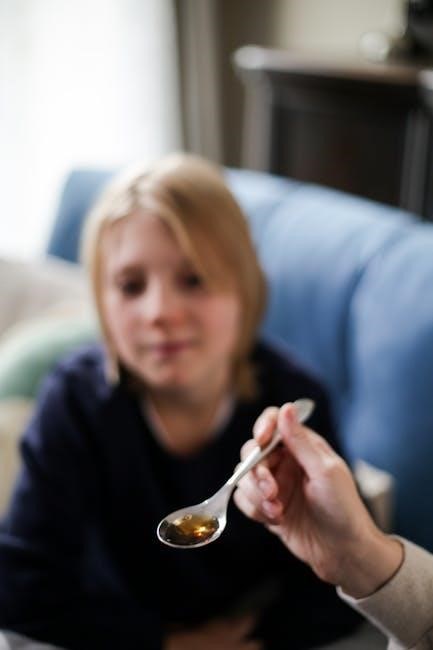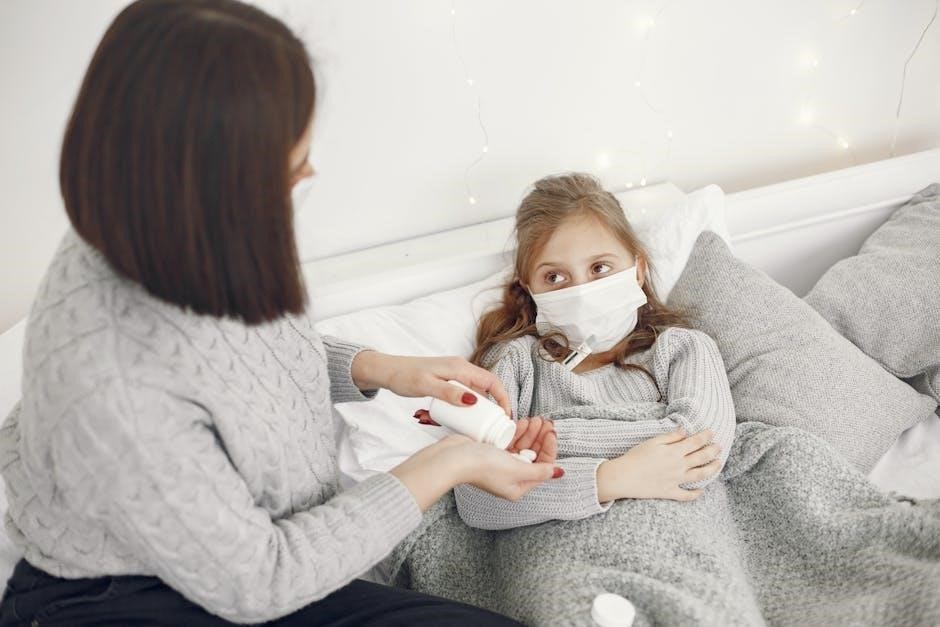A daycare sick policy ensures a healthy environment by preventing the spread of illnesses. It outlines guidelines for handling sick children, promoting safety and well-being for all.
Importance of a Sick Policy in Daycare Settings
A sick policy is essential in daycare settings to minimize the spread of illnesses and ensure a healthy environment for children and staff. It protects vulnerable children, such as those with weakened immune systems, from potential infections. By establishing clear guidelines, the policy helps reduce the risk of outbreaks and promotes transparency between parents and caregivers. Early detection and response to sickness prevent the spread of infections, while also ensuring that sick children receive the care they need at home. A well-defined sick policy fosters a safer space for learning and development, reducing absenteeism and maintaining the overall well-being of the daycare community.
Objective of the Daycare Sick Policy
The primary objective of a daycare sick policy is to safeguard the health and well-being of children, staff, and families. It aims to prevent the spread of contagious illnesses by establishing clear guidelines for exclusion, notification, and care procedures. The policy ensures that sick children are isolated and cared for appropriately while maintaining a healthy environment for others. It also provides a framework for communication between parents and caregivers, ensuring that everyone is informed and involved in the child’s care. By setting specific criteria for when a child should stay home or be sent home, the policy helps reduce the risk of illness transmission and supports the overall health of the daycare community. This clear approach promotes consistency, safety, and trust among all stakeholders.

Key Guidelines for Sick Policy

Key guidelines include preventing germ spread, excluding sick children, and ensuring clear communication. These rules help maintain a healthy environment for all daycare attendees.
Healthcare Requirements for Enrollment
All children must be up-to-date on immunizations unless medically exempt, with documentation provided. A well-child check within six months of enrollment is mandatory. Parents must submit vaccination records and any medical exemptions. This ensures compliance with health standards and protects all children in the daycare. Proper documentation helps prevent the spread of preventable diseases. Medical clearance is required for children returning after an illness. These requirements are essential for maintaining a safe and healthy environment for all attendees.
Exclusion Criteria for Sick Children
Children displaying symptoms of contagious illnesses, such as fever, vomiting, or rash, must be excluded from daycare. Those with severe colds or infections that hinder participation in activities are also excluded. A PCR test is recommended for suspected COVID-19 cases. Exclusion protects other children and staff from infection. Children under age 2 with symptoms must stay home. Parents must pick up sick children promptly, within one hour of notification. This ensures the health and safety of everyone in the facility, preventing outbreaks and maintaining a healthy environment for all attendees. Proper isolation procedures are followed for sick children until they are picked up.


Handling Sick Children in Daycare
Sick children must be isolated promptly, monitored closely, and their symptoms documented. Parents are notified immediately to arrange pickup, ensuring the child receives proper care and attention.
Isolation Procedures for Sick Children
When a child becomes sick, they must be immediately isolated from others to prevent the spread of illness. A designated, safe, and comfortable area should be provided for the sick child, where they can rest and be supervised. Staff should maintain a safe distance while caring for the child and ensure proper hygiene practices, such as handwashing and disinfecting surfaces. The child’s symptoms should be closely monitored and documented. Parents or guardians must be notified promptly to arrange for the child to be picked up within a reasonable time frame. This process ensures the child receives appropriate care while protecting the health of others in the daycare setting.
Notification and Communication
Parents must be immediately notified if their child shows symptoms of illness. The daycare will contact emergency contacts if parents are unreachable, ensuring timely communication and child safety.

Parent Notification Process

When a child becomes ill or shows symptoms of an illness, parents or guardians will be notified immediately. Daycare staff will contact parents via phone or email to inform them of their child’s condition. If parents cannot be reached, the emergency contacts listed on the enrollment form will be contacted. The notification will include details about the child’s symptoms, such as fever, vomiting, or rash, and any actions taken to comfort the child. Parents are expected to arrange for their child to be picked up within one hour of being notified. Daycare facilities are not equipped to care for sick children, so prompt pickup is essential. Regular updates on the child’s condition will be provided until the child is picked up. This process ensures open communication and prioritizes the child’s health and well-being.

Preventing the Spread of Illness
Preventing the spread of illness in daycare involves frequent handwashing, disinfecting surfaces, and teaching proper hygiene practices to staff and children. Regular cleaning and vaccination compliance are emphasized.
Hygiene Practices in Daycare Facilities
Hygiene practices in daycare facilities are crucial to preventing the spread of illnesses. These include frequent handwashing with soap and water for at least 20 seconds, especially before meals, after using the restroom, and after coughing or sneezing. Staff and children should sanitize hands regularly, and toys and surfaces should be disinfected daily. Proper cleaning of soiled tissues and immediate disposal in covered bins are essential. Teaching children to cover their mouths and noses when coughing or sneezing and avoiding touching their faces helps reduce germ spread. Staff should model and reinforce these habits, ensuring a clean environment for everyone. Regular training for staff on hygiene best practices further strengthens these efforts, creating a safer space for children to thrive.
Medical Clearance for Return
A medical clearance statement is required after illness to confirm a child is healthy and ready to resume daycare activities safely.
Requirements for Returning After Illness
Children must meet specific criteria before returning to daycare after an illness. A medical clearance statement from a healthcare provider is often required to ensure the child is no longer contagious and is fit to participate in daily activities. Fever must be resolved for at least 24 hours without medication. For contagious illnesses like strep throat or conjunctivitis, a doctor’s note confirming treatment and recovery is necessary. Proper hygiene practices, such as handwashing, must be followed upon return. Additionally, any open sores or wounds must be covered and treated to prevent the spread of infection. These requirements ensure the health and safety of the child and others in the daycare environment.
Legal and Regulatory Compliance
Daycare facilities must adhere to state and local health regulations to ensure compliance with legal standards for managing illnesses and maintaining a safe environment.
State and Local Health Regulations
Daycare facilities must comply with state and local health regulations to ensure the safety and well-being of children. These regulations often include specific guidelines for managing illnesses, such as fever thresholds (e.g., 100.4°F or higher) and contagious conditions like lice or pinkeye. Requirements may also involve exclusion periods for sick children, mandatory reporting of outbreaks, and protocols for medical clearance before a child’s return. For instance, some jurisdictions require a PCR test for certain illnesses or a doctor’s note for readmission. Compliance with these rules helps prevent the spread of infections and ensures that daycare centers maintain a healthy environment. Facilities must stay updated on local health department directives, as regulations can vary by region and may change in response to public health concerns. Adherence to these standards is crucial for legal operation and the protection of all children and staff. Proper documentation and communication with parents are also essential components of compliance.